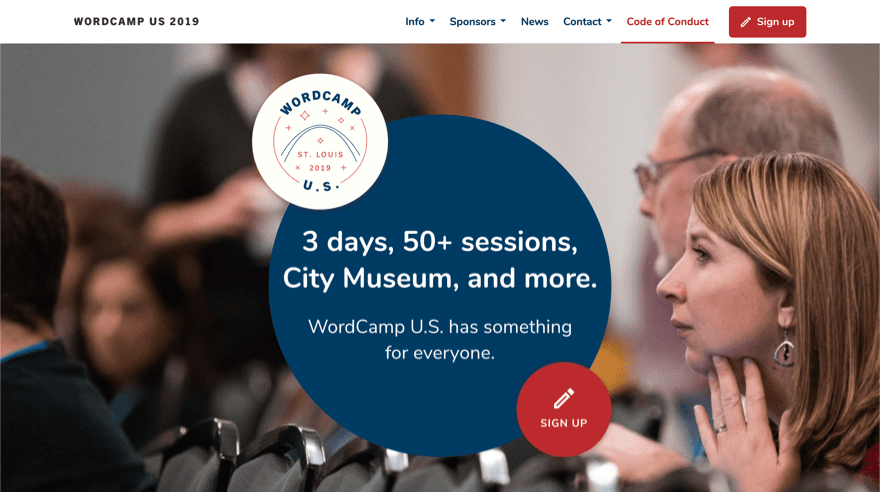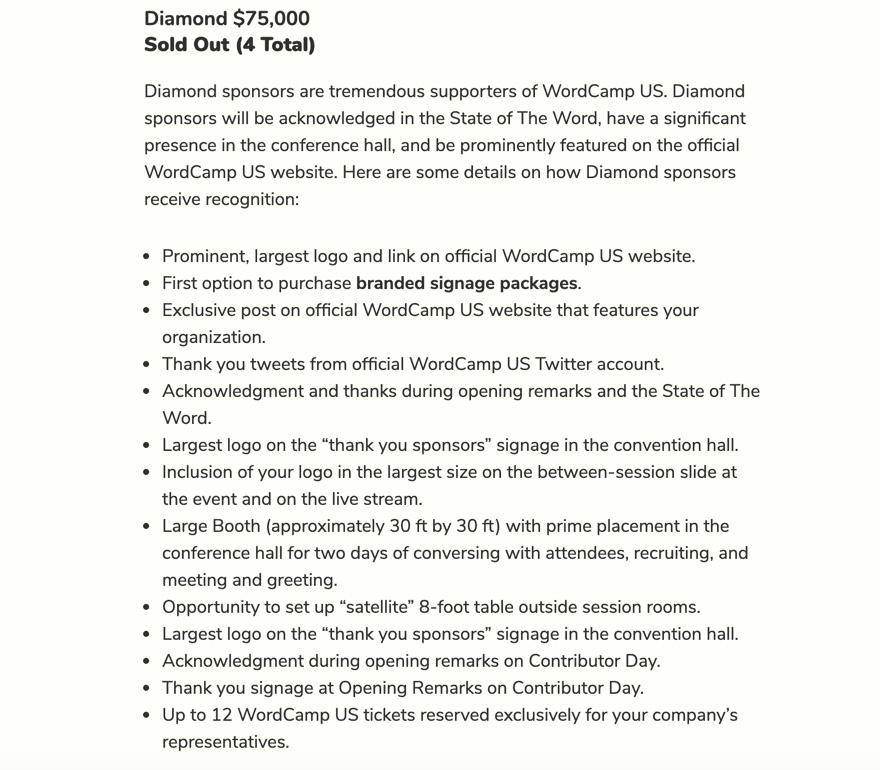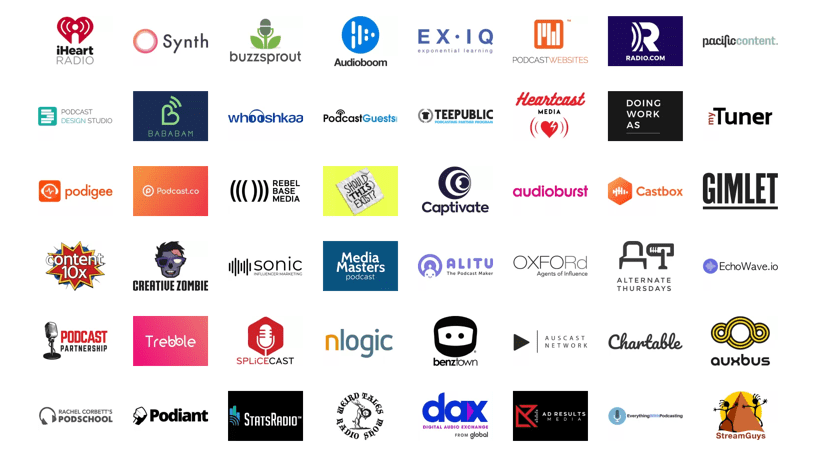If you are looking for how to get sponsored, you likely rely on donations or sponsorships for funding. And making sure that you are asking the right way is integral to your success. You must make sure that you lead your sponsors to the decision to hand you their money in the best way possible. Because this is so important, we want to walk you through some best practices for making the most out of your sponsorship page.
Taking a Cue from WordCamp US
First, we want to show you an example of how to get sponsored the right way. There are no hard and fast rules for sponsorship pages. However, there are things that potential sponsors look for. Some common elements. We will show you how some highlights and then break down what specific purpose they serve (and how you can best take advantage of them on your own sponsorship page) using the 2019 sponsorship page for WordCamp US.

WordCamp US is the national WordPress conference for the United States. It’s a big deal. Because it’s a big deal, the organizers need a lot of money to put it on. Thousands upon thousands of people attend WCUS each year. Some domestically and some internationally. Tickets for 2019 are $50, which is absurdly low for conference registration. That cost is subsidized by sponsors, so making sure they have the best sponsorship page possible is important.
So let’s look at what they’ve done well so that you can steal their design use their page for inspiration.
1. The Title Matters

For WCUS, the page is titled Call for Sponsors. At least until the initial window of time is open where they’re actively looking to gain funds. The term Call for Sponsors indicates that they’re actively searching, that there’s a time limit, and that it’s important to the event. Some pages choose to title How to Sponsor Us, Sponsors, or Sponsor MyBrand. Those are more passive titles that don’t create urgency in the potential sponsors.
Generally when a Call for X goes out, be it proposals, sponsors, papers, or something else, that indicates there is a deadline and the potential to miss out on it. You want to engender a sense of FOMO (fear of missing out) in your potential sponsors. And the first way to do that is through a limited-time event they will regret passing up.
If you’re running an ongoing sponsorship drive (say for a blog, brand, or podcast) instead of a one-off surge of funding, titles such as Advertise with MyBrand/Us work really well. This is a sponsorship page. Advertisers are sponsors. But you might just be providing all the information they need to run monthly ads on your site or for your partner program. Choose a title that indicates what your sponsorship model is. That way, you will be far more likely to attract people who match up with you.
1a. Make the Page Easily Accessible
As you can see in the image above, the Sponsors link in the header menu links directly to the Call for Sponsors page. No matter where your visitors are on the site, they will have access to the sponsor page within just a click. Additionally, if you include it in the footer or elsewhere, the extra spots will not only be more likely to get potential sponsors to see it, but everyday users are more likely to click into it and see who is sponsoring the event or project. That gives you
2. Give a Reason You Need Sponsorships
At its core, sponsorships are you asking for money. So you have to make sure that you’re worth them giving money to. That’s a big ask. Most people, by the time they get to the point where they’re ready to ask for sponsorships, have a clear idea of why they need the money and what that sponsorship money will go toward. If you’re reading this, you probably do, too.
For WCUS, they work to make an affordable conference that embraces the sense of open community behind WordPress itself. That means that tickets need to be subsidized via sponsorships. The actual verbiage is:
Simply put, without our generous sponsors, WordCamp US would not be affordable to the vast majority of the WordPress community. A $50 ticket provides three full days for attendees to gain insight from our speakers, network with others, and contribute to the open source WordPress project. By donating to WordCamp US you further the project’s mission to democratize publishing through Open Source, GPL software.
By taking their example and putting your expenditures front-and-center, you are more likely to attract high-dollar sponsors. The more generic you keep your copy, the less likely people will want you handling their money.
For instance, all of your donations go toward operating expenses could mean nearly anything. But your donations will be used to pay for venue costs, technology rentals, catering expenses, and volunteer thank-you packages will let them know that you’re forward-thinking enough to manage their money effectively and not squander it on unnecessary costs. You use sponsorships to pay for things like hosting, equipment upgrades, media, etc. for creative works like podcasts or YouTube videos. Disclose that. Let your audience know they can sponsor you and help make your content better.
3. Give Sponsorship Options

The main way in how to get sponsored is simple: be everything to everyone. While that’s generally impossible, it doesn’t have to be regarding your sponsorship page. Perhaps the most important aspect of finding sponsorships is making sure that everyone can contribute. In WCUS’s case, there are 8 sponsorship levels across the conference itself and the after party (which are always worth attending, by the way).
These levels vary in price from the $500 microsponsorship (“You get everything you would from a General Admission ticket plus a sense of satisfaction in knowing that you’re giving extra financial support”) to the $75,000 Diamond sponsorship (whose perks are listed in the screenshot above).
Even $500 is a lot for a microsponsorship for smaller events and brands, but you can have whatever prices you want and call it whatever you want. Community Sponsor is a common one that includes the tax-write-off-feel-goodiness of sponsoring an event and gets you extra money to do what you need to do.
Additionally, if you are curious about how to get sponsored for a podcast or similar creative endeavor, you can have different sponsor levels for when their message is read/played/shown. Generally, podcast advertisements come in pre-roll (before the show), mid-roll (in the middle of the show), and post-roll (after the show). They generally decrease in price depending on how far into the episode they’re played. So a sponsor with a smaller budget might opt for a post-roll rather than one in a pre-roll that’s pretty much a guaranteed play.
Those kinds of options are important to keep a varied revenue stream for whatever you’re collecting sponsorships for.
4. Provide the Best Possible Perks

Perks matter. A lot. Understandably, perks that sponsors get for being a part of the event or program or whatever aren’t generally going to be monetarily sound on their part. They might donate $20,000 and part of the package is 4 tickets to an event where tickets are 400 each. That’s a great bonus, but it’s not worth the price of admission (literally). You have to inflate prices for the perks you give sponsors, otherwise, their money isn’t able to go where it’s needed.
However, when combined with advertising, booth space, social media shout-outs, logo being plastered on materials, signage, etc., the overall marketing value skyrockets. But not every sponsor wants all of that stuff. Not every sponsor can afford all of that stuff. Which is why you have various tiers on your sponsorship page.
Even the lowest tiers should have something offered. Look at many Patreon or Kickstarter pages. These are basically sponsorship sites, looking for investments on an upcoming project. The lowest tier of reward tends to be something like you get a personalized thank you card or you get the smug satisfaction of knowing you are awesome for helping out. It doesn’t have to be a lot, but make the perks and rewards for being a sponsor worth the amount.
If you’re asking for $500, don’t tell them all they get is a thank you on your website. But at the same time, you can’t give $25 sponsors as many physical perks as the $500 ones. You can, however, make the perks equitable and proportionate to the sponsorship and list them in detail on your sponsorship page.
5. Make The Sponsors Visible

And finally, to make your sponsorship page as spectacular as possible, you want to make sure that the public acknowledgment of your sponsors is high-quality. Most sponsor packages include some kind of website inclusion. Maybe it is in the form of a simple link, or maybe their participation nets them a large clickable image of their logo.
Whatever that may be, this kind of acknowledgment is actually important. It’s very easy to phone this aspect in. To throw the logos and links in a block or bulleted list and let it be.
If it is at all possible, don’t do that.
It has the potential to make your sponsors feel undervalued. That is the last thing that you want. While this method is common (and does work, admittedly), there are better ways to handle it. The issue here is that your users won’t pay attention to them. A block of logos just bleeds together. Sure, some might be larger or more colorful, but they blur together and basically just become visual white noise.
So putting a little effort in with displaying your sponsors goes a long way. If you offer email inclusion in your tiers, send individual blasts out for each sponsor at that level. Lumping them all together in a thanks to our sponsors email is the equivalent of the block of logos.
Now, sometimes (as in the case of WCUS), that’s impossible. You might have simply too many sponsors to give that much individual real estate. But you can still separate them by tier. And have their logos in descending sizes. (800×800 for the top, 500×500 for mid, and so on.) And if you do text links (without logo images), consider breaking them into paragraphs with a small blurb (just a sentence or two that can even be provided by the sponsor themselves) to make each one stand out from the surrounding ones.
Wrapping Up
If you can take all of those elements and practices, wrap them up in a nice aesthetically pleasing web page, you will absolutely have sponsors beating down your door to give you money. Well, maybe that’s hyperbole, but using these elements and best practices, you can be sure that you have put your best face forward and that all the potential sponsors have everything they need to decide if they want to partner with you.
How do you get sponsored, folks? Let us know in the comments what works for you!
Article featured image by VectorMine / shutterstock.com
The post How to Create the Best Sponsorship Page Possible appeared first on Elegant Themes Blog.
